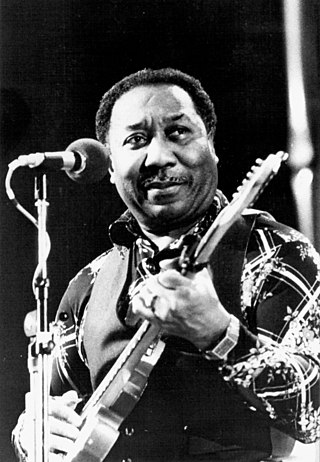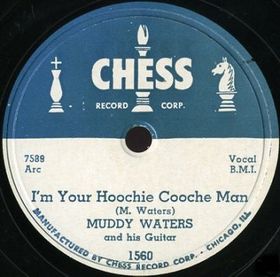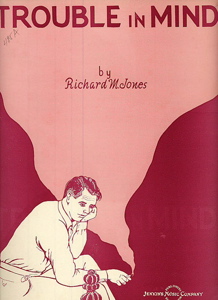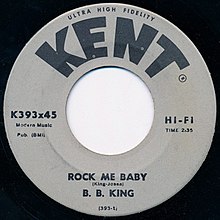Earlier songs
B.B. King's "Rock Me Baby" is based on the 1951 song "Rockin' and Rollin'" by Lil' Son Jackson. King's lyrics are nearly identical to Jackson's, although instrumentally the songs are different: "Rockin' and Rollin'" is a solo piece, with Jackson's vocal and guitar accompaniment, whereas "Rock Me Baby" is an ensemble piece.
Muddy Waters' song "Rock Me", recorded in 1956, is also based on Jackson's song. Some of Jackson's lyrics were used, but Waters incorporated a couple of verses from his 1951 song "All Night Long" (that is also based on "Rockin' and Rollin'"). Muddy Waters' version also uses Jackson's guitar figure and the starting of the vocal on the IV chord and he interpreted it as an unusual fifteen-bar blues (an uneven number of measures, rather than the traditional twelve bars or somewhat less common eight or sixteen bars). Muddy Waters recorded a second version of "Rock Me" for his 1978 album I'm Ready . [4]
Lil' Son Jackson's "Rockin' and Rollin'" was inspired by earlier blues songs. Many songs from the 1920s through the 1940s have some combination of rock, roll, baby, and mama in the title or lyrics, although instrumentally they are different than "Rock Me Baby", "Rock Me", or "Rockin' and Rollin'". Big Bill Broonzy's 1940 song "Rockin' Chair Blues" serves as the basis for several renditions and makes frequent use of the phrase "rock me baby" as in "Rock me baby now, rock me slow ... now rock me baby, one time before you go". Arthur Crudup's 1944 song, "Rock Me Mama", is also based on Broonzy's song and repeats the same refrain, but uses "mama" in place of "baby". "Roll Me Mama", a 1939 song by Curtis Jones shares a couple of phrases ("like a wagon wheel", "ain't got no bone") with "Rockin' and Rollin'".
B.B. King song
"Rock Me Baby" is a medium-tempo twelve-bar blues notated in the key of C in common or 4
4 time. King's guitar fills are a key feature of the song, leading to its appeal to guitarists. [8] The piano part is also prominent. Kent part-owner Joe Bihari recalled the pianist as King's frequent collaborator Maxwell Davis, although others have been suggested, such as Lloyd Glenn and Jimmy McCracklin.
There is some confusion as to when B.B. King recorded "Rock Me Baby". Although King had signed to ABC-Paramount Records on January 14, 1962, his former label, Kent Records, continued to release singles (and albums) well into the 1970s. [8] Recording dates have been estimated as "about 1958" [8] to before 1962. The song was released shortly after King's Paramount release "How Blue Can You Get" in 1964 and reached number 34 in the Billboard Hot 100. [lower-alpha 1] "Rock Me Baby" was the first of six B.B. King records to reach the Top 40. In 1997, King re-recorded the song with Eric Clapton for the album Deuces Wild .

Slide guitar is a technique for playing the guitar that is often used in blues music. It involves playing a guitar while holding a hard object against the strings, creating the opportunity for glissando effects and deep vibratos that reflect characteristics of the human singing voice. It typically involves playing the guitar in the traditional position with the use of a slide fitted on one of the guitarist's fingers. The slide may be a metal or glass tube, such as the neck of a bottle, giving rise to the term bottleneck guitar to describe this type of playing. The strings are typically plucked while the slide is moved over the strings to change the pitch. The guitar may also be placed on the player's lap and played with a hand-held bar.

McKinley Morganfield, known professionally as Muddy Waters, was an American blues singer and musician who was an important figure in the post-World War II blues scene, and is often cited as the "father of modern Chicago blues". His style of playing has been described as "raining down Delta beatitude".

"The Thrill Is Gone" is a slow minor-key blues song written by West Coast blues musician Roy Hawkins and Rick Darnell in 1951. Hawkins's recording of the song reached number six in the Billboard R&B chart in 1951. In 1970, "The Thrill Is Gone" became a major hit for B.B. King. His rendition helped make the song a blues standard.

"Rollin' Stone" is a blues song recorded by Muddy Waters in 1950. It is his interpretation of "Catfish Blues", a Delta blues that dates back to 1920s Mississippi. "Still a Fool", recorded by Muddy Waters a year later using the same arrangement and melody, reached number nine on the Billboard R&B chart. "Rollin' Stone" has been recorded by a variety of artists.

"Baby, Please Don't Go" is a traditional blues song that was popularized by Delta blues musician Big Joe Williams in 1935. Many cover versions followed, leading to its description as "one of the most played, arranged, and rearranged pieces in blues history" by French music historian Gérard Herzhaft.

"Rollin' and Tumblin'" is a blues standard first recorded by American singer-guitarist Hambone Willie Newbern in 1929. Called a "great Delta blues classic", it has been interpreted by hundreds of Delta and Chicago blues artists, including well-known recordings by Muddy Waters. Rock musicians usually follow Waters' versions, with the 1960s group Cream's rendition being perhaps the best known.

"Train Kept A-Rollin'" is a song first recorded by American jazz and rhythm and blues musician Tiny Bradshaw in 1951. Originally performed in the style of a jump blues, Bradshaw borrowed lyrics from an earlier song and set them to an upbeat shuffle arrangement that inspired other musicians to perform and record it. Johnny Burnette and the Rock and Roll Trio made an important contribution in 1956 – they reworked it as a guitar riff-driven song, which features an early use of intentionally distorted guitar in rock music.

"Trouble No More" is an upbeat blues song first recorded by Muddy Waters in 1955. It is a variation on "Someday Baby Blues", recorded by Sleepy John Estes in 1935. The Allman Brothers Band recorded both studio and live versions of the song in the late 1960s and 1970s.

"Hoochie Coochie Man" is a blues standard written by Willie Dixon and first recorded by Muddy Waters in 1954. The song makes reference to hoodoo folk magic elements and makes novel use of a stop-time musical arrangement. It became one of Waters' most popular and identifiable songs and helped secure Dixon's role as Chess Records' chief songwriter.

"I'm a King Bee" is a swamp blues song written and first recorded by Slim Harpo in 1957. It has been performed and recorded by numerous blues and other artists since. In 2008, Slim Harpo's original recording received a Grammy Hall of Fame Award.

"Worried Life Blues" is a blues standard and one of the most recorded blues songs of all time. Originally recorded by Big Maceo Merriweather in 1941, "Worried Life Blues" was an early blues hit and Maceo's most recognized song. An earlier song inspired it and several artists have had record chart successes with their interpretations of the song.
Melvin "Lil' Son" Jackson was an American blues guitarist and singer. He was a contemporary of Lightnin' Hopkins.

"Trouble in Mind" is a vaudeville blues-style song written by jazz pianist Richard M. Jones. Singer Thelma La Vizzo with Jones on piano first recorded it in 1924 and in 1926, Bertha "Chippie" Hill popularized the tune with her recording with Jones and trumpeter Louis Armstrong. The song became an early blues standard, with numerous renditions by a variety of musicians in a variety of styles.

"Key to the Highway" is a blues standard that has been performed and recorded by several blues and other artists. Blues pianist Charlie Segar first recorded the song in 1940. Jazz Gillum and Big Bill Broonzy followed with recordings in 1940 and 1941, using an arrangement that has become the standard.

"Black Angel Blues", also known as "Sweet Black Angel" or "Sweet Little Angel", is a blues standard that has been recorded by numerous blues and other artists. The song was first recorded in 1930 by Lucille Bogan, one of the classic female blues singers. Bogan recorded it as a mid-tempo, twelve-bar blues, featuring her vocal with piano accompaniment.

"Every Day I Have the Blues" is a blues song that has been performed in a variety of styles. An early version of the song is attributed to Pinetop Sparks and his brother Milton. It was first performed in the taverns of St. Louis by the Sparks brothers and was recorded July 28, 1935 by Pinetop with Henry Townsend on guitar. The song is a twelve-bar blues that features Pinetop's piano and falsetto vocal. The opening verse includes the line "Every day, every day I have the blues".

"That's All Right"or "That's Alright" is a blues song adapted by Chicago blues singer and guitarist Jimmy Rogers. He recorded it in 1950 with Little Walter on harmonica. Although based on earlier blues songs, music writer John Collis calls Rogers' rendition "one of the most tuneful and instantly memorable of all variations on the basic blues format". The song became a blues standard and has been recorded by numerous blues and other artists.
"Early in the Morning" is a blues song that was recorded by Sonny Boy Williamson I in 1937. Identified as one of his most successful and influential tunes, it was inspired by earlier blues songs. "Early in the Morning" has been recorded by various musicians, including Junior Wells, who made it part of his repertoire.

"Bottle Up and Go" or "Bottle It Up and Go" is a song that is a standard of the blues. Based on earlier songs, Delta bluesman Tommy McClennan recorded "Bottle It Up and Go" in 1939. The song has been interpreted and recorded by numerous artists, sometimes using alternate titles, such as "Step It Up and Go", "Shake It Up and Go", etc.

Rocks The Blues is the first album credited to musician Ike Turner. Released in 1963 from Crown Records, it contains mostly previously released singles from the 1950s.


















